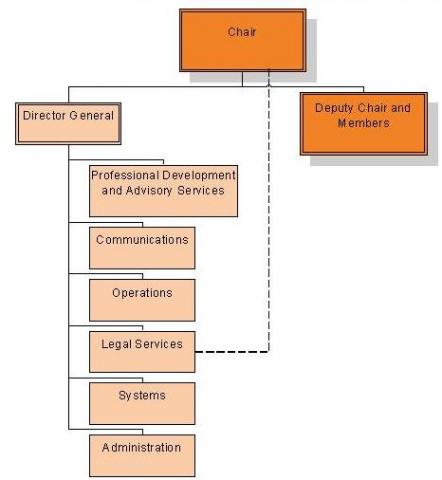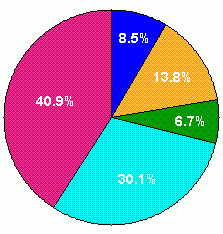Update 2009
Table of Contents
Message from the Chair
In the spring of 2009, I left my job as a bilingual partner in the law firm Cox and Palmer in Fredericton to begin a six year term as Chair of the Veterans Review and Appeal Board. As the proud son of a Second World War Veteran, I was keen to contribute to this Board. Since I began my new role, I have studied the legislation that governs the Board’s appeal program and the disability pension and award process itself. I have learned about the Board’s operations and the path of a claim from application to decision. Most importantly, I have observed and participated in hearings and have gained valuable insight about the parties involved: from the Board Members, who hear and decide the claims; to the representatives, who prepare and present the cases; to the applicants, who have served their country and have asked for an independent review of their disability decisions. In short, I have come to appreciate the importance of the Board’s work and the impact it has on people’s lives. As Chair, I consider it my job to guide the Board in delivering a fair and effective program. An important part of this is to engage people by informing them about our accomplishments and our challenges. To this end, I am pleased to offer you this update.
John D. Larlee
Chair, Veterans Review and Appeal Board
Our Mission
To ensure fairness in Canada’s programs for disability pensions and awards and War Veterans Allowances by providing fair and expeditious appeals for war Veterans, eligible Canadian Forces Veterans and still-serving members, RCMP applicants, qualified civilians and their families.
Our Appeal Program
- Independent
- Informal, expeditious and non-adversarial process
- Opportunity to testify at review hearing
- Alternative hearing methods
Our Mandate
The Veterans Review and Appeal Board provides an independent appeal process for applicants who are not satisfied with a disability decision made by Veterans Affairs Canada (VAC, the Department). It provides two levels of redress (review and appeal) for pension and award applications dealing with matters of entitlement and assessment as well as the final level of appeal for War Veterans Allowance claims. The Board may affirm, vary or reverse decisions made by the Minister of Veterans Affairs or refer decisions back to the Minister for reconsideration. The Board’s work is governed by the Veterans Review and Appeal Board Act and associated regulations.
Our Organization
This organizational chart illustrates how the Veterans Review and Appeal Board is structured. The Chair has supervision over and direction of the work of the Board, including the allocation of work among its Members, the conduct of its work, the management of its internal affairs and the duties of its staff. The Board's operations are divided into Professional Development and Advisory Services; Legal Services; Operations; Communications; Systems; and Administration.
The Board’s program is delivered by not more than 29 permanent Members (section 4, Veterans Review and Appeal Board Act) and a staff of approximately 85 public servants.
Our Members
Members are appointed for fixed terms by the Governor in Council. They qualify for appointment through a transparent process that assesses their experience, education and ability to do the work. The Board’s membership is dynamic and reflects a wide range of life and work experience, including former members of the military, lawyers, nurses and other skilled professionals. About half of the Members work primarily out of cities across Canada to accommodate applicants’ requests for review hearings. Review hearings were held in 31 locations in 2008-09. The review hearing is the only time in the process when the applicant may appear before the decision-makers and testify about the facts of his or her case. The remaining Members are based at the Board’s Head Office in Charlottetown to deal primarily with appeals.
The work is demanding: in a typical week, Members prepare to hear cases by reviewing the documented evidence; conduct sessions of hearings with four-to-six cases each; deliberate and decide the claims following each hearing; and write decisions that outline clear reasons for the rulings.
Our Workload
The Board has no control over how many applicants will decide to request an independent hearing of their case. In 2008-09, it issued 6,922 review and appeal decisions – a considerable workload for a small tribunal. The Board also dealt with a small number of War Veterans Allowance claims and applications for reconsideration (pursuant to subsection 32(1) of the Veterans Review and Appeal Board Act). Back, knee and foot conditions as well as hearing loss were the most common disability claims brought before the Board. The number of complex cases is on the rise and the Board is challenged to invest time in training for its Members while responding to applicants who want shorter wait times for hearings and decisions.
Our Applicants 2008-2009
This pie chart illustrates the make-up of the Board's applicants for 2008-09. In terms of percentages, 6.7 per cent are still-serving members of the Canadian Forces; 8.5 per cent are members of the RCMP; 13.8 per cent are Active Force Veterans (WWI,WWII,Korea); 30.1 per cent are released members of the Canadian Forces; and 40.9 per cent are members of the Canadian Forces with service in a Special Duty Area/Special Duty Operations.
Improving Our Process
The Board is focused on providing timely hearings and decisions for applicants by managing the time lines within its control. In most cases, the applicant’s experience with the redress process begins when he or she contacts a representative to discuss the merits of appealing a disability pension or award decision. The Bureau of Pensions Advocates, an organization of lawyers within VAC, and service organizations such as the Royal Canadian Legion, offer free counselling on redress options as well as case preparation and presentation. The Board has no involvement until the applicant decides to proceed and his or her representative registers a request for a hearing. This prompts the Board to gather and scan all the documents used by the decision-makers at the previous level. In 2008-09, the Board developed and implemented a time-saving method of storing and sharing this hearing documentation using a system that is accessible in “real time” to Members and representatives across the country. Once this documentation has been provided, it is up to the representative to indicate that the claim is ready to be heard. Confirming a hearing date depends on the applicant’s readiness as well as availability in the Board’s hearing schedule. For 2009-10, the Board has implemented an annual schedule for review hearings to ensure that its capacity for hearings is identified far enough in advance for the representatives to fill all available spots. The Board has also invested in video-conferencing technology to meet the needs of applicants at both levels and to ensure a timely process. The Board’s involvement ends once it has mailed a written decision to the applicant, usually within six weeks of the hearing. At that time, it also sends a copy of the decision to VAC to process and, if necessary, make payments.
| Type of Claim | 2007-08 | 2008-09 |
|---|---|---|
| Reviews | 180 calendar days | 174 calendar days |
| Appeals | 114 calendar days | 65 calendar days |
Our Decisions
Pursuant to legislation enacted by the Parliament of Canada on behalf of Canadian citizens, two basic factors determine an individual’s entitlement to a disability pension or award from Veterans Affairs: (1) credible evidence of a permanent disability; and (2) credible evidence the disability was incurred during or is related to service. In 2008-09, the Board awarded either new or increased entitlement or assessment for some aspect of applicants’ service-related disability claims in 65.4% of its 4,224 review decisions and in 45.2% of its 2,698 appeal decisions. In general, the two factors weighing most heavily in varying the Department's decisions at the review level are the applicant's testimony at the hearing and evidence that was not available to the previous decision-makers. At the appeal level, applicants may submit additional documented evidence and written information but cannot testify in person as at the review level. If an applicant has exhausted all redress options within the Board and remains dissatisfied, he or she has the right to apply to the Federal Court for a judicial review of the decision. The Board monitors the outcome of these applications to ensure any guidance given by the Court is reflected in its decisions, policies and operations.
Our Priorities
For the past three years (2006-2009), the Board has been guided by three priorities: (1) to hear and adjudicate claims fairly and expeditiously; (2) to make the processing of claims as efficient as possible; and (3) to engage in communications with applicants and stakeholders. While the Board is currently reviewing its strategic plan, it is certain these priorities will shape the future. As a small tribunal, the Board is challenged to deliver its core program while responding to fluctuating volumes of applications and increased demands from applicants and central agencies. While operating in an increasingly complex environment, the Board remains committed to good public service management and to fulfilling its mandate.
Contact Us
Please contact the Veterans Review and Appeal Board to learn more about our role, responsibilities and processes:
Phone:
In Canada, call us toll-free at
1-800-450-8006 (English)
1-877-368-0859 (French)
Outside Canada, call us collect at
1-902-566-8751 (English)
1-902-566-8835 (French)
Fax: 1-902-566-7850
Mail:
Veterans Review and Appeal Board
161 Grafton Street
P.O. Box 9900
Charlottetown PE C1A 8V7
Web site: www.vrab-tacra.gc.ca



